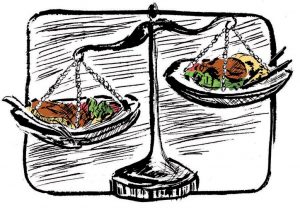The realities of the world food system carry emotional and moral weight. Images of hunger to the point of starvation, especially of children, is not just difficult to see, but difficult to know exist at this very moment around the world. The statistics and numbers are one aspect, but the level of suffering that is ongoing before the statistical metric of death is clicked and added to the total is hard to fathom. Coupling these images with Tristam Stuart’s lecture about food waste, I can’t help but feel shameful for participating in my own wasteful habits and disregard.
There are also many reasons to be hopeful in this week’s materials. The “push-pull” method of maize cultivation in Africa is a brilliant solution to several problems. It exhibits the wisdom of moving away from monoculture production and into polycultural farming practices.
I did find myself quite angry while reading about the history of hunger and food used as tools by rulers or governments in order to create or maintain hegemonic power over whole cultures or societies. The fact that the Irish Potato Famine was really a genocidal act, but since “genocide” wasn’t a term that existed for another 80 years kept it from being labeled as such, really struck me. My own ancestry can be traced to an Irishman who came to America in 1856 and settled in Iowa. Seeing migration as a consequence of hunger and realizing my place in the world as a partial result of that was eye opening.

Ultimately, there is enough food in the world for all, and it is systemically possible to feed the world. The interference of greed or power must be confronted with legislation and policy, but I may see amazing results within my lifetime.
Image: Baker, Linda. “Food Politics, Part 2.” Oregonbusiness.com, 2017, www.oregonbusiness.com/article/item/17841-editor-s-note
